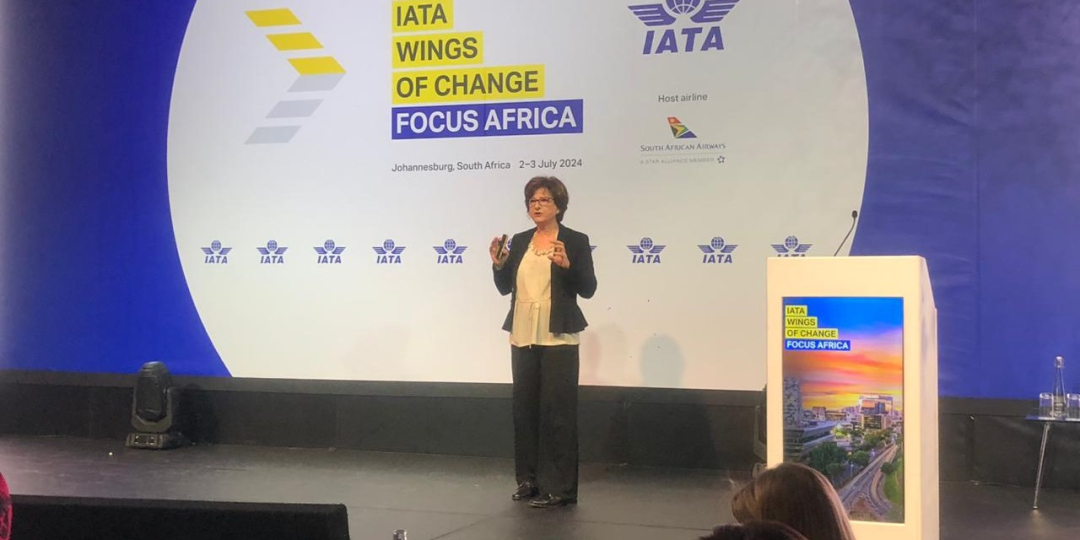IATA has called on South Africa to mobilise its experience, resources, and infrastructure to accelerate the development of Sustainable Aviation Fuel (SAF) production.
The call came as industry and government delegates gathered for IATA’s Wings of Change Focus Africa conference in Johannesburg this week.
“South Africa has vast potential to become a leading SAF producer in the region. And there is a waiting market for SAF as airlines work to achieve nett-zero carbon emissions by 2050. More than a strategy in support of aviation’s decarbonisation, it is a strategy for economic development and should be a top priority for the new South African government,” said Dr Marie Owens Thomsen, IATA Senior VP for Sustainability and Chief Economist.
South Africa chaired the 2022 International Civil Aviation Organization (ICAO) Assembly where governments agreed to a long-term goal aligned with the aviation industry’s commitment to net-zero carbon emissions by 2050.
The role of SAF in achieving this goal was emphasised by the ICAO CAAF/3 objective of a 5% average global reduction in aviation’s carbon emissions by 2030.
“Airlines are ready and waiting to purchase SAF, as evidenced by the fact that every drop of SAF produced has been purchased and used. But the production volumes are a minute fraction of what aviation needs. That’s why it is essential for governments of countries with production potential, such as South Africa, to embrace what is a unique win-win-win opportunity for economic development, energy transition, and decarbonised air transportation,” said Thomsen.
IATA highlighted several advantages for South Africa in developing SAF production, which have also been noted by a study undertaken by the World Wildlife Fund (WWF):
- Feedstock potential: South Africa has an abundance of feedstocks from which SAF can be derived, including sugarcane low-carbon byproducts and biomass from cleared invasive alien plants (IAPs). Regarding IAPs, harvesting them will come with other environmental benefits such as improved biodiversity and water security. In all cases, no feedstocks would compete with food production for land or water use in line with the ICAO sustainability framework.
- Significant production capacity: The WWF estimates that South Africa has the potential to produce between 3,2 and 4,5 billion litres of SAF annually. This will more than meet domestic fuel demand (1,8 billion litres) and present an export opportunity. Achieving production at the higher range of potential would require the co-development of a green hydrogen capability.
- Existing refinery infrastructure: South Africa has existing refinery infrastructure, which should be explored for brownfield investments – plant conversions or co-processing.
- Experience: South Africa has long experience in synthetic fuel production, particularly the Fischer-Tropsch method (a collection of chemical reactions that converts a mixture of carbon monoxide and hydrogen, known as syngas, into liquid hydrocarbons). Moreover, the country’s robust academic and research institutions also have a history of supporting innovations and technology for fuel production. “It’s time we see policies to enable their role in SAF deployment,” said IATA.
- Strategic geographic location: South Africa’s airports, particularly OR Tambo International Airport in Johannesburg and Cape Town International Airport, serve as important hubs for connecting flights within Africa and to other parts of the world.
To capitalise on South Africa’s SAF potential, IATA has urged the SA government to adopt a strategic plan that should include four critical areas: Industrial Infrastructure, Pooling Resources, Incentives for Research and Development, and Investment in Infrastructure.
Meanwhile, the Financial Times reported this week that Shell had halted construction work at its Rotterdam plant, which was designed to convert waste into jet fuel. The facility was designed to produce 820 000 tonnes of biofuels a year, half of which was to be used for SAF. Shell officials have cast doubt on its long-term viability.
A UBS analyst commented to Reuters on the issue: “The delays further highlight that the advanced biofuels market is not an easy one. The oil majors have dipped their toes and found it challenging.”














